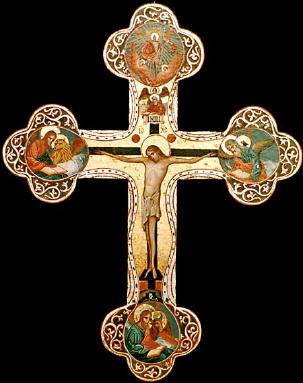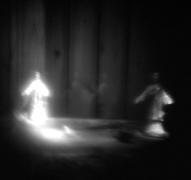Cross of Glory
At this point, which is about halfway through the Lenten desert, the Church plants an encouraging signpost for the weary: the Cross of  Christ, which reminds us of the goal of our efforts and indeed of our whole life. This Sunday’s Offices focus not on the pain or the horrors of the Crucifixion, but on the glory of Christ’s triumph and of the joy this brings to the faithful: “Shine, Cross of the Lord, shine with the light of your grace upon the hearts of those who honor you. With love inspired by God, we embrace you, O desire of all the world. Through you our tears of sorrow have been wiped away; we have been delivered from the snares of death and have passed over to unending joy… Hail, life-giving Cross, the fair Paradise of the Church, Tree of incorruption that brings us the enjoyment of eternal glory: through you the hosts of demons have been driven back and the hierarchies of angels rejoice with one accord as the congregations of the faithful keep the feast. You are an invincible weapon, an unbroken stronghold; you are the victory of kings and the glory of priests…”
Christ, which reminds us of the goal of our efforts and indeed of our whole life. This Sunday’s Offices focus not on the pain or the horrors of the Crucifixion, but on the glory of Christ’s triumph and of the joy this brings to the faithful: “Shine, Cross of the Lord, shine with the light of your grace upon the hearts of those who honor you. With love inspired by God, we embrace you, O desire of all the world. Through you our tears of sorrow have been wiped away; we have been delivered from the snares of death and have passed over to unending joy… Hail, life-giving Cross, the fair Paradise of the Church, Tree of incorruption that brings us the enjoyment of eternal glory: through you the hosts of demons have been driven back and the hierarchies of angels rejoice with one accord as the congregations of the faithful keep the feast. You are an invincible weapon, an unbroken stronghold; you are the victory of kings and the glory of priests…”
I could go on and on (as the services do!), but at the mention of kings and priests I’d like to pause, for that connects us to the Epistle for the day (Heb. 4:14 – 5:6). Christ is here described as our High Priest, and our access to Him is described as approaching the Throne of Grace. If Christ were King only and not Priest as well, we might envision the Throne of Grace as a kind of heavenly version of the massive, glittering thrones we expect earthly kings to be seated upon. But Christ as High Priest reigns from the throne of the Cross, for that is the source of the grace that we seek for help in time of need, and indeed for salvation itself. This grace was won for us at the supreme cost of the Lord’s self-offering on the Cross, the Sacrifice in which He is both Priest and Victim: the One who offers and is offered to the Father, the Lamb of God who takes away the sins of the world, the One who receives our worship and whose sacrificed Body and Blood we receive in Holy Communion.
Christ’s high-priesthood is inseparable from his divine sonship. In what may seem to be a curious formulation, the author of Hebrews says that Christ was appointed High Priest by the Father, who said “You are my Son; today I have begotten you.” It is almost as if sonship necessarily implies priesthood, for “You are my Son” is offered as the first “proof text” for Jesus’ high priesthood. Only after this is the pertinent psalm quoted: “You are a priest forever.” Something of this mystery is preserved in the sacramental order of the Church. A man must be baptized before he can be ordained a priest. He must be an adopted son of God before he can have a share in the sacrificial priesthood of Christ.
By the grace of the Holy Spirit working through the priestly ministry in the Church, Christ’s own sacrifice is perpetuated—not repeated, not added to, but simply made present in a mystical and sacramental manner for the sake of the sanctification of the faithful. This is our most fruitful and intimate access to the Throne of Grace.
But the priesthood of Christ extends, albeit in a different way, beyond the bounds of the sacramental ministry, because all who have been baptized into Christ have put on Christ and thus have become sons and daughters of God. There is also a priesthood of the faithful, and this leads us to reflect upon the Gospel for this Sunday (Mark 8:34 – 9:1). This particular share in Christ’s priesthood does not give the faithful the grace and the command to make present the mystery of the Cross and Resurrection through offering the Divine Liturgy of the Holy Eucharist, but it is still intimately related to the sacrificial mystery of the Cross.
St Paul and St Peter and the author of Hebrews tell us that God expects all Christians to offer spiritual sacrifices of good works, almsgiving, etc, which are pleasing to God. Jesus puts it in the context of the Cross—carrying our own crosses as a way of sharing in the grace of his Cross. He doesn’t offer it as an option, nor does He say to do this only “if you would be perfect.” No, Jesus prefaces his teaching on bearing ones cross by saying, “If anyone would come after me,” that is, if anyone wishes to be his disciple, the basic requirement is this: deny yourself, take up your cross, and follow Him.
Here is where we are tested to see what we are made of, if our profession of faith is just words or if it is backed up by commitment, fidelity, and sacrifice. It is easy to sing about the joy and glory and victory of the Cross on feast days, but what happens when it is actually laid upon our shoulders? What happens when we are called to share in the mystery of Jesus’ redemptive suffering, when we are called to bear one another’s burdens, to resist temptations, to endure hardships and setbacks for the sake of the Gospel? Maybe our liturgical hymns go a little flat at this point. Maybe the “yes” we say on feast days begins to waver under the pressure of the daily grind.
Jesus doesn’t let up, however. He drives his point home: “For whoever would save his life will lose it, and whoever loses his life for my sake and the gospel’s will save it. For what does it profit a man to gain the whole world and lose his soul?” Some translations read “life” instead of “soul,” and the Greek psyche can be translated either way, but if we’re going to say “life” it can only mean eternal life, that is, the life of the human being that is more than mere biological or earthly life. For everyone is going to lose his life, that is, endure bodily death, whether they gain the world or not. But Jesus is making a point here concerning something about which we have a choice. We don’t have a choice about eventually losing our bodily life. But we do have a choice about whether or not we are going to lose our immortal souls.
In order to secure the salvation of our souls, Jesus says we have to sacrifice our lives. We have to understand the plays on words here. First, if we really are concerned merely with saving, that is, prolonging as much as possible our bodily lives, we must know that we will eventually lose them. But people today don’t want to think about death. There are definite benefits to having reasonable concern for bodily health, but many people turn it into an obsession, seeking out the ultimate “anti-aging” drugs or herbs, undergoing endless cosmetic surgeries, trying desperately to preserve their quickly-fading youth. Underlying all these efforts is the fear of death, plastered over with the denial of death. But sooner or later, the naked truth will have to be faced.
For others, saving their lives means not primarily preserving physical youthfulness but simply having whatever they want as long as they can enjoy it. The selfish, the greedy, the hedonists all want to “save their lives,” that is, they make pleasure and comfort and wealth their goals, their idols, and any invitation to take up their crosses and follow the Crucified Carpenter of Nazareth is not only an unwelcome intrusion, it is viewed with contempt or ridicule. But Jesus is trying to warn them: what you are enjoying today will be gone tomorrow; you are trying to save your life, which you identify with your pleasures, but you will lose it—unless you decide to follow Me.
So then, to take up our crosses is to lose our lives, it is to exercise the sacrificial priesthood of daily life. It is to lose our preoccupation with ourselves, our health, our looks, our possessions, our comforts and all our idols, whatever they may be. Look at how much time you spend in any selfish occupation or fantasy and you will know what your idols are. Where your treasure is, there will your heart be also.
Jesus Christ, the King and High Priest who reigns from the Throne of Grace—the precious and life-giving Cross—calls us to come up higher, calls us out of self-preoccupation so that we can gain the eternal perspective that should characterize our world-view. He wants us to realize the unsurpassable value of our immortal souls, which are worth even losing our very lives to save. Nothing in this world is worth so much to justify exchanging our own souls for it. For this world is passing away, but Heaven remains forever.
Let each one of us, in the particular way and measure we share in the priesthood of Christ, take up our crosses as a spiritual sacrifice offered to God in union with Jesus. Let us not fear to follow Him, whatever the cost in this passing life. Lose your life to save it: that is the word of the Cross that our Lord Jesus shares with us today. As we accept that rough and heavy wood as our daily companion, let us lift up our eyes and see the Cross of Jesus opening the gates of Paradise to us. On that day all our hymns will find their fulfillment in truth: the Cross will shine like the New Jerusalem, with all the beauty and glory of God. And the Master will invite us to lay down the burdens we faithfully carried in this life, and to come and share his everlasting joy.







